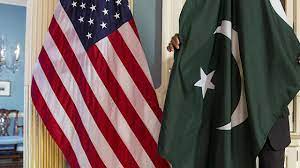K N Pandita
US-Pak relations had plummeted to a nadir during the closing days of Imran Khan’s government. The successor government was conscious of it. Therefore, among other things, the Shahbaz Sharif government very much liked to reset relations with a country about which a former military dictator had once said that “Pakistan is more aligned to the US than the allies”.
There has been an exchange of high-level visitors from both sides but with a difference. The rest of the relations appear to have a low trajectory in the sense that the sides are looking for the basis of a partnership that is de-hyphenated from Afghanistan as well as India.
This is for the first time in Pakistan’s history of independence that a delink from both of her neighbours is under consideration. The implication of de-linking means that Pakistan can no longer use the lever of Indian threat or Afghan involvement to secure hefty military grants from the US as in the past.
Pakistani circles have been interpreting the exchange of visits as a strong indication of Pakistan tilting away from China. There is nothing as yet to make us imagine the cooling of relations between Pakistan and China. Nevertheless, China not coming to rescue Pakistan from economic and financial collapse and Beijing sternly demanding Pakistan to ensure the security of Chinese nationals deputed to work on various projects in Pakistan, are no insignificant clues to what could be the nature of the Sino-Pak relationship in days to come.
Observers have quoted unnamed sources that during his September 2022 visit to Washington, the then Pakistani COAS General Bajwa had expressed a desire for a South Korea-like alliance with the United States
Commenting on the suggestion of Pakistan military man, the Asia Times of February 1 wrote, “But the United States has no interest nor needs to play such a role in South Asia. Pakistan is not a pivotal state for the US and other great powers, but rather an economically unstable nation that is beseeching great and regional powers for economic support.”
Why have the goalposts changed and how come a country once the apple of the eye of the US has fallen low in its estimation? A dispassionate analysis of Pakistan’s recent history will show that a disastrous domestic policy with widespread ramifications has been the root cause of Pakistan’s misery. Seldom does a country raise fundamentalists and jihadists to be used as the instruments of State policy. Pakistan chose to ride the tiger and she has to pay a price for getting down it. The Taliban are her creation, the TTP was her choice and sheltering Osama was brandished as Islamic pride.
Perhaps Pakistani leaders have begun to realize how they isolated themselves from the international community which had always been adhering to a legal and constitutional dispensation.
Pakistan’s strategic community has skillfully managed resistance from great powers to achieve the national aim, including its nuclear weapons Programme. The powers were aware of what Pakistan was trying to achieve secretly, and, therefore, as she was basking in the American sunshine, no notice was taken of the right or wrong acquisition of nuclear capability.
The conditions today are different. The US has withdrawn from Afghanistan. The war on terror has almost faded. Whatever terror is left in the region is Pakistan’s creation and she must resolve the juggernaut. It does not affect any great power much less the US. Thus, Pakistan’s geopolitical importance is reduced. Today’s geopolitics is not determined by military prowess but by energy resources and knowledge economy-driven technologies like artificial intelligence. Pakistan lags in these paramount services.
But the question is whether Pakistan’s policy planners are prepared to come to terms with her growing geopolitical irrelevance. When they are attempting a rejig of relations with the US, they cannot ignore this vital deficit.
Pakistan has to realize the fallout of rebalancing relations with the US and its implications for its relations with China. As we understand there may be a genuine desire in the Biden administration to normalize relations with Pakistan, but the question is what will be the level of these relations. The ceiling will be low, in any case. As of today, Pakistan’s relations with the US are modest but her relations with China are very significant. Pakistan is in no way capable of making a U-turn in its relations with China because of the enormous debt burden. A low ceiling means that Pakistan does not enjoy the previous preference for enormous military aid from the US. Interestingly, Ukraine which has taken the place of Pakistan as the US’ proxy to confront Russia is receiving arms and ammunition from Pakistan.
Asian Times writes, “But now there is little appetite for directing large sums of aid or bureaucratic bandwidth toward Pakistan. Resentment toward Islamabad is pervasive in Washington as its military is seen as a major cause of the United States’ failure in Afghanistan.”
Commentators think that given this scenario, relations between the two countries will be limited to the non-strategic domain. “For Washington, Islamabad will occupy a regional status akin to that of Dhaka, not New Delhi— albeit with a greater security dimension.
In the final analysis, Pakistan is not in a happy position and seeking American patronage is out of the question. The blame has not to be brought only to Imran Khan but largely and essentially to making terrorism an instrument of state policy. The time has gone when this malady could have been rectified. The stark history looks straight into the eyes of Pakistan and what can rescue her is astute leadership with a global vision that can pull her out of the shenanigans of the medieval ages.
Trending Now
E-Paper


